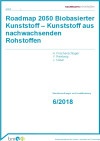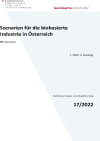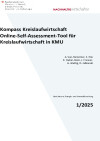Suchergebnisse
Berichte aus Energie- und Umweltforschung 8/1998 Innovationen für eine nachhaltige Entwicklung

Beitrag für die Ausrichtung eines Technologieschwerpunktes "Nachhaltig Wirtschaften"
Stereolithographie-Materialien, Produktion und Plasma-Nachbearbeitung für langlebige Automobilanwendungen (SYMPA)
Im Projekt entwickelt ein deutsch-österreichisches Konsortium nachhaltige Materialien, Prozesse und Nachbehandlungsverfahren für den 3D-Druck (Stereolithografie) für den dauerhaften Einsatz in Automobilanwendungen. Im Fokus liegen neue Polymermaterialien, Anlagenentwicklung, Steigerung der Steifigkeiten, Festigkeiten, UV-Stabilität, Verschleißreduktion und verkürzte Prozesszeiten.
Stochastische Methodik zur Multiskalen-Modellierung für die Bewertung der Ausfallwahrscheinlichkeit von Faserverbundwerkstoffen
Die herstellungsbedingte Streuung der Eigenschaften von Faser-Verbund-Werkstoffen führt in der Folge zu überdimensionierten Bauteilen/Strukturen, um die Unsicherheiten zu kompensieren. Daher soll eine neue stochastische Homogenisierungsmethode entwickelt werden. Diese Methode basiert auf einem Multiskalen-Modellansatz und soll die Ausfallwahrscheinlichkeit in der Mikro-Skala berechnen und über die Meso-Skala auf die Makro-Skala übertragen.
Rohstoffsituation Bayern - keine Zukunft ohne Rohstoffe
In dieser Studie wird die Rohstoffsituation in Bayern bzw. der bayerischen Wirtschaft analysiert. Neben der Abschätzung des Rohstoffeinsatzes und der Identifizierung von etwaigen Risiken und Schwachstellen der Rohstoffversorgung werden potenzielle Gegenstrategien diskutiert.
Cascading BIOMATTERS for wellness and life-style
This application oriented and basic research aims to develop a pilot-master-project in the region of eastern Styria and Burgenland for the cascading use of regional cultivated plants and plant-residues in order to produce wellness and lifestyle-products - by which the creation of value is strongly realated to the functional qualities of the available biomatters.
Colors of Nature - Pflanzenfarbstoff in der Praxis
Durch die Optimierung der Farbstoffherstellung und der Färbetechnologie wird Pflanzenfarbstoff "Colors of Nature" marktfähig. In Kooperation mit den Unternehmen der Textil-, Agrar-, lebensmittel- und holzverarbeitenden Industrie wurde entlang der Wertschöpfungskette ein konkurrenzfähiges Produkt entwickelt, das nicht nur ökologische Vorteile bringt, sondern auch regionale Wertschöpfung generiert.
Roadmap 2050 Biobasierter Kunststoff – Kunststoff aus nachwachsenden Rohstoffen

Es wurde ein „Szenario 2050 – Kunststoff aus nachwachsenden Rohstoffen (biobasierter Kunststoff)" ausgearbeitet. Dieses Szenario soll mit dem hypothetischen Ziel erstellt werden, dass Biokunststoffe bei in der EU hergestellten Produkten einen Marktanteil von 100 % erreichen.
Schriftenreihe
6/2018
H. Frischenschlager, V. Reinberg, J. Kisser
Herausgeber: BMVIT
Deutsch, 84 Seiten
Downloads zur Publikation
Bioökonomie - Eine Strategie für Österreich

Die Bundesregierung hat sich im Regierungsprogramm und der #mission2030 vorgenommen, eine Strategie für Bioökonomie in Österreich zu erstellen. Diese österreichische
Bioökonomiestrategie soll einen wesentlichen Eckpfeiler der Klima- und Energiestrategie
darstellen und die Dekarbonisierung des Wirtschaftssystems unterstützen.
Rene Albert, Karolina Begusch-Pfefferkorn, Georg Kanz, Gottfried Lamers, Christian Plas, Isabella Plimon, Hubertus Schmid-Schmidsfelden, Lorenz Strimitzer, Katrin Völk, Andreas Weber, Bernhard Zenz, Theodor Zillner
Herausgeber: BMNT, BMBWF, BMVIT
Deutsch, 71 Seiten
Szenarien für die biobasierte Industrie in Österreich (BBI-Szenarien)

Um die Umsetzung der österreichischen Bioökonomiestrategie Österreichs (BMNT, BMBWF & BMVIT, 2019) zu unterstützen, wurden drei Szenarien für die biobasierte Industrie in Österreich
entwickelt. Die vorliegende Studie soll als solide Übersicht und als Startpunkt für weitere Detailstudien auch von weiteren Forscher:innen dienen.
Schriftenreihe
17/2022
T. Steffl, V. Reinberg
Herausgeber: BMK
Deutsch, 52 Seiten
Downloads zur Publikation
Dokumentarfilm "Die Fabrik der Zukunft"
Die Fernsehdokumentation für ORF/3sat und Bayern alpha zeichnet das Bild einer nachhaltigen Produktions- und Arbeitswelt, beschreibt wegweisende Technologien und zeigt, wie die Fabrik der Zukunft bereits heute funktioniert.
Natural Dyes for the Textile Industry
New cooperations between agriculture und industry are necessary to ensure the utilization of renewable materials. The project´s focus is upon natural dyes and their application in textile industry. The goal of the project is to create a contact institution which connects various suppliers of diverse plant materials, takes on the processing, and standardising of the natural dyes, and makes a product that can be used by the industry.
Improvement of resource efficient use of wood
Modelling of wood processing in order to demonstrate the developments' impacts on performance
Adsorbent Materials of Residues from Corn Cob
Development and testing of processes to produce adsorptive materials from agricultural residues of corn production with focus on corn cob grit as oil bonding agent (e.g., applicable to the remediation of oil spills).
Quality criteria for the Building of Tomorrow
Development and implementation of contributions to the quality control of innovative technologies in the areas of building services and insulation that are derived substantially from HAUSderZukunft findings.
Kompass Kreislaufwirtschaft - Online-Self-Assessment-Tool für Kreislaufwirtschaft in KMU

Im Projekt Kreislaufwirtschaftskompass wurde ein responsives Online-Self-Assessment-Tool für Kreislaufwirtschaft in KMU entwickelt. Der Kompass Kreislaufwirtschaft fragt in innovativer Weise die wichtigsten Handlungsfelder zur Umsetzung einer effizienten Kreislaufwirtschaft für österreichische Produktionsbetriebe (Schwerpunkt KMU) in einem Online-Fragebogen ab und ermöglicht auf Basis eines theoriebasierten Bewertungsschemas den Betrieben, mit vertretbarem Aufwand ihre Circular Economy Readiness einzustufen.
Schriftenreihe
1/2025
A. Van-Hametner, S. Eisl, K. Huber-Heim, J. Fresner, G. Gluttig, D. Jablonski Berichte aus Energie- und Umweltforschung 1/
Herausgeber: BMK
Deutsch, 36 Seiten
Downloads zur Publikation
Bio-based adhesives for floor coverings (BioGlue)
Das BioGlue-Projekt untersucht die Möglichkeit, maßgeschneiderte sogenannte „Bioklebestoffe“ für Boden- und Wandverkleidungen im Innenbereich herzustellen. Ziel ist es, traditionell verwendete, nicht erneuerbare, fossile Klebstoffe durch nachwachsende Rohstoffe, nämlich Lignin, zu ersetzen. Diese „Bioklebestoffe“ werden unter Einsatz umweltfreundlicher Enzym-basierter Technologien entwickelt.
Sustainable Binders / Nachhaltige Bindemittel für Spanplatten (SUSBIND)
Das SUSBIND-Projekt entwickelt, produziert und testet biobasierte Bindemittel als Alternative zu den derzeit für Holzwerkstoffplatten in der Möbelprodukten verwendeten Bindemitteln auf fossiler Basis. SUSBIND deckt die gesamte Wertschöpfungskette von Rohstoffen bis zur Pilotproduktion und Validierung durch relevante Partner aus Forschung, Industrie und KMU ab. Dem Projektgremium gehören auch führende Möbelhersteller und Einzelhändler an.
Nachhaltige, multifunktionale Düngemittel für die Versorgung von Pflanzen mit Phosphaten und Eisen (SUSFERT)
Entwickelt werden nachhaltige, multifunktionale Dünger für die Pflanzenversorgung mit Phosphor und Eisen, um konventionelle, fossile Produkte ersetzen zu können. Die SUSFERT-Dünger basieren auf Neben- und Abfallprodukten mehrerer Industrien und stärken so die Kreislaufwirtschaft.
BioABC – Biologische Umwandlung von Abfall zu Butanol mit CO2 Fixierung
Im Projekt Bio-ABC soll ein zweistufiger Prozess für die Fixierung von CO2 entwickelt werden. Im ersten Schritt soll das fixierte CO2 in eine Speicherchemikalie (Essigsäure) umgewandelt werden, die dann in einem weiteren zweiten Prozessschritt zu einem Alkohol umgewandelt wird. Durch das zweistufige System bietet diese Lösung ein hohes Maß an Flexibilität und Weiterentwicklungsmöglichkeiten.
Leitprojekt „addmanu“ -Stärkung der österreichischen Wertschöpfungsketten für generative Fertigung in der industriellen Produktion
Das Leitprojekts addmanu konzentrierte sich auf die Erforschung und die Weiterentwicklung der additiven Fertigung (AM) zur Etablierung einer High-Tech-Technologie für kleine Losgrößen und komplexen Geometrie mit dem Ziel Stärkung der Innovationskraft in Österreich. Forschungsthemen spannten sich umfassend über die gesamten Wertschöpfungsketten von AM und trugen zur Bildung eines nationalen Forschungscluster bei.
